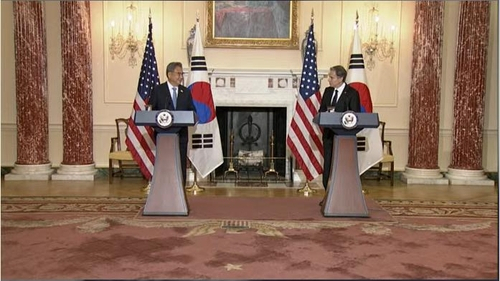 |
South Korean Foreign Minister Park Jin (L) and US Secretary of State Antony Blinken are seen holding a joint press conference after their meeting at the state department in Washington on Monday in this image captured from the website of the state department. (Yonhap) |
WASHINGTON -- South Korean Foreign Minister Park Jin and his US counterpart Antony Blinken on Monday urged North Korea to refrain from staging additional provocations including a nuclear test, saying that they will only further isolate the impoverished country.
The top diplomats also said North Korean provocations will be met with a strong response.
"We affirm that any North Korean provocations, including a nuclear test, will be met with a united and firm response from our alliance and the international community," Park said in a joint press conference with his US counterpart.
The Park-Blinken meeting, the first of its kind since the South Korean foreign minister took office last month, comes amid suspicions that North Korea may soon conduct a nuclear test.
Park said the North may have completed all preparations for a nuclear test and that only thing left now may be a "political decision."
Blinken agreed, saying, "We remain concerned about the prospects for what would be a seventh nuclear test over multiple administrations."
North Korea conducted its sixth nuclear test in September 2017.
"We are being extremely vigilant about that," said the US secretary when asked about the possibility of a North Korean nuclear test in the near future.
"We are in very close touch with our close allies and partners, starting with the Republic of Korea, also with Japan and others, to be able to respond quickly," he added, referring to South Korea by its official name.
Blinken said US response to a North Korean nuclear test may include "short and longer-term adjustments to our military posture as appropriate."
The top US diplomat reiterated that Washington remains committed to engaging in dialogue with Pyongyang.
"We urge the DPRK to refrain from further destabilizing activity," he said, referring to North Korea by its official name, the Democratic People's Republic of Korea.
"We call on the DPRK to engage in serious and sustained diplomacy, and indeed in that regard we are prepared, as we have been, to proceed with no preconditions," he added.
Blinken, however, also underscored the importance of keeping pressure on the recalcitrant country until it changes its behavior.
"Our goal, simply put, is a peaceful and stable region and world," he told the joint press conference at the state department. "Until the regime in Pyongyang changes course, we will continue to keep the pressure on."
Park said a new nuclear test will further isolate Pyongyang.
"If North Korea ventures into another nuclear test, I think that it will only strengthen our deterrence and also international sanctions. It will only isolate North Korea from the international community," he said, adding the allies will certainly push for a new UN Security Council resolution against North Korea if it goes ahead with a nuclear test.
The South Korean diplomat also said he and Blinken have agreed on the early reactivation of high-level alliance dialogue on extended deterrence, known as Extended Deterrence Strategy Consultation Group (EDSCG).
"The EDSCG will serve as a timely and effective mechanism to discuss concrete extended deterrence measures, as well as to send North Korea a firm message," said Park.
He added the countries have agreed to reactivate the strategic dialogue at the earliest date possible "because it deals with Korean security, peace and stability, and also including the timely deployment of strategic assets when necessary."
The strategic dialogue between Seoul and Washington was suspended in 2018 amid the fervor of engagement with Pyongyang, which included three inter-Korean summits, as well as two historic US-North Korea summits in 2018 and 2019.
North Korea has since avoided any denuclearization talks. It also remains unresponsive to any US overture since the Joe Biden administration took office early last year. (Yonhap)



![[Herald Interview] 'Trump will use tariffs as first line of defense for American manufacturing'](http://res.heraldm.com/phpwas/restmb_idxmake.php?idx=644&simg=/content/image/2024/11/26/20241126050017_0.jpg)


![[Health and care] Getting cancer young: Why cancer isn’t just an older person’s battle](http://res.heraldm.com/phpwas/restmb_idxmake.php?idx=644&simg=/content/image/2024/11/26/20241126050043_0.jpg)
